九年级英语第三单元语法总结完整版
九年级unit 3知识点总结

九年级unit 3知识点总结Unit 3 知识点总结Unit 3 是九年级英语课程中的一个重要单元,本文将对该单元的知识点进行总结。
内容包括:名词性从句、情态动词、宾语从句、反意疑问句以及其他相关语法知识和常用短语。
一、名词性从句名词性从句是句子中用作名词的从句,可以充当主语、宾语、表语和同位语。
常见的引导词有:that, whether, if, who, whom, whose, what, which等。
名词性从句往往由以下句式构成:1. 主语从句:What he said is true.2. 宾语从句:I am not sure if/whether he will come.3. 表语从句:The question is who will go with us.4. 同位语从句:The news that he passed the exam is exciting.二、情态动词情态动词用于表示说话人对某种行为或状态的态度、意愿、能力等。
常见的情态动词有:can, could, may, might, must, shall, should, will, would等。
1. 表示能力和允许:can, could, may, might- They can swim very well.- Could I borrow your pen, please?- May I go to the restroom?2. 表示推测和猜测:must, may, might- He must be at home. I saw his car outside.- It may rain tomorrow. Take an umbrella with you.- He might not have heard the news yet.3. 表示义务和建议:must, should, ought to- You must finish your homework before going out to play.- You should/ought to apologize to him for your mistake.4. 表示将来:shall, will- I shall/will come to see you tomorrow.三、宾语从句宾语从句在句子中作为动词的宾语。
九年级上册笔记英语第三单元
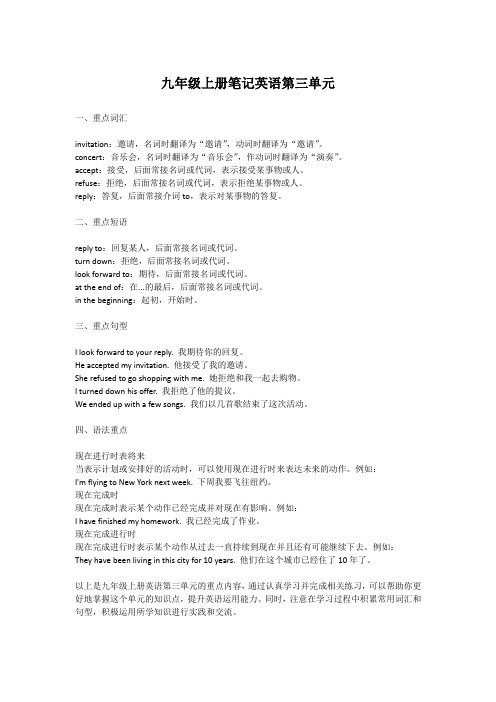
九年级上册笔记英语第三单元一、重点词汇invitation:邀请,名词时翻译为“邀请”,动词时翻译为“邀请”。
concert:音乐会,名词时翻译为“音乐会”,作动词时翻译为“演奏”。
accept:接受,后面常接名词或代词,表示接受某事物或人。
refuse:拒绝,后面常接名词或代词,表示拒绝某事物或人。
reply:答复,后面常接介词to,表示对某事物的答复。
二、重点短语reply to:回复某人,后面常接名词或代词。
turn down:拒绝,后面常接名词或代词。
look forward to:期待,后面常接名词或代词。
at the end of:在...的最后,后面常接名词或代词。
in the beginning:起初,开始时。
三、重点句型I look forward to your reply. 我期待你的回复。
He accepted my invitation. 他接受了我的邀请。
She refused to go shopping with me. 她拒绝和我一起去购物。
I turned down his offer. 我拒绝了他的提议。
We ended up with a few songs. 我们以几首歌结束了这次活动。
四、语法重点现在进行时表将来当表示计划或安排好的活动时,可以使用现在进行时来表达未来的动作。
例如:I'm flying to New York next week. 下周我要飞往纽约。
现在完成时现在完成时表示某个动作已经完成并对现在有影响。
例如:I have finished my homework. 我已经完成了作业。
现在完成进行时现在完成进行时表示某个动作从过去一直持续到现在并且还有可能继续下去。
例如:They have been living in this city for 10 years. 他们在这个城市已经住了10年了。
以上是九年级上册英语第三单元的重点内容,通过认真学习并完成相关练习,可以帮助你更好地掌握这个单元的知识点,提升英语运用能力。
九年级英语unit3知识点归纳
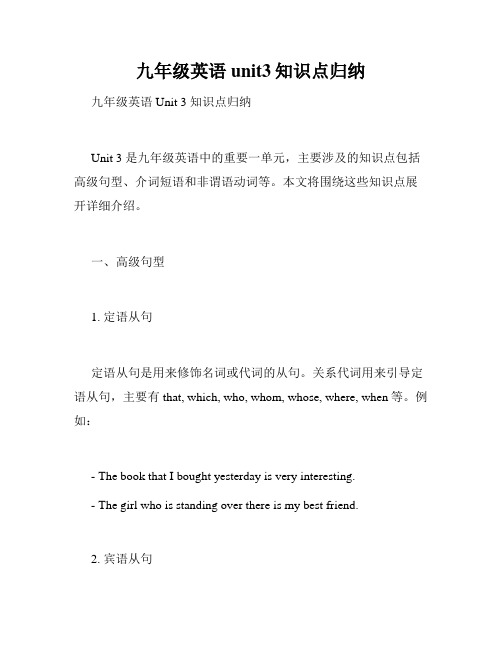
九年级英语unit3知识点归纳九年级英语Unit 3 知识点归纳Unit 3 是九年级英语中的重要一单元,主要涉及的知识点包括高级句型、介词短语和非谓语动词等。
本文将围绕这些知识点展开详细介绍。
一、高级句型1. 定语从句定语从句是用来修饰名词或代词的从句。
关系代词用来引导定语从句,主要有that, which, who, whom, whose, where, when等。
例如:- The book that I bought yesterday is very interesting.- The girl who is standing over there is my best friend.2. 宾语从句宾语从句是在主句中作为宾语的从句。
常用的引导词有that, whether, if等。
例如:- I don't know if it will rain tomorrow.- She asked me whether I had finished my homework.3. 状语从句状语从句是用来修饰主句的副词从句,常用的引导词有when, while, after, before, since, until等。
例如:- He always listens to music while he is doing his homework.- I will call you back as soon as I finish my work.二、介词短语介词短语在句中起着修饰或者指示的作用,可以表达时间、地点、原因、方式等。
常见的介词短语有at, in, on, of, for, with, by等。
例如:- I will meet you at the park tomorrow.- She is good at playing the piano.三、非谓语动词非谓语动词是指在句子中作为非主谓部分的动词形式,包括动词不定式、动名词和现在分词。
九年级英语3单元的知识点
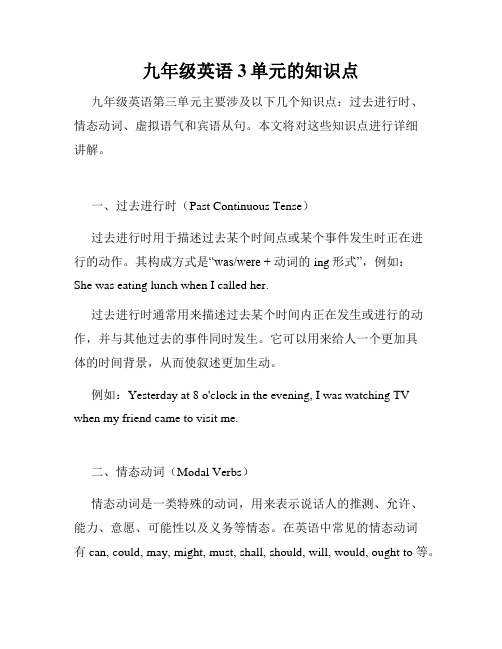
九年级英语3单元的知识点九年级英语第三单元主要涉及以下几个知识点:过去进行时、情态动词、虚拟语气和宾语从句。
本文将对这些知识点进行详细讲解。
一、过去进行时(Past Continuous Tense)过去进行时用于描述过去某个时间点或某个事件发生时正在进行的动作。
其构成方式是“was/were + 动词的ing形式”,例如:She was eating lunch when I called her.过去进行时通常用来描述过去某个时间内正在发生或进行的动作,并与其他过去的事件同时发生。
它可以用来给人一个更加具体的时间背景,从而使叙述更加生动。
例如:Yesterday at 8 o'clock in the evening, I was watching TV when my friend came to visit me.二、情态动词(Modal Verbs)情态动词是一类特殊的动词,用来表示说话人的推测、允许、能力、意愿、可能性以及义务等情态。
在英语中常见的情态动词有can, could, may, might, must, shall, should, will, would, ought to等。
情态动词的用法多种多样,根据不同的语境有不同的含义和用法。
例如,can表示能力,may表示允许,must表示必须等。
情态动词在句子中通常与动词原形搭配使用。
例如:You must finish your homework before going out to play.表示“你必须在出去玩之前完成作业”。
三、虚拟语气(Subjunctive Mood)虚拟语气用于表示与事实相反、假设、愿望、建议等非真实情况。
主要包括虚拟条件句、虚拟愿望句、虚拟建议句等。
虚拟语气的构成方式多样,根据不同的情况采用不同的形式。
例如,如果我们想表达对于过去的事实的惋惜或遗憾,可以使用“should have + 过去分词”的形式。
九年级英语第三单元知识点

九年级英语第三单元知识点九年级英语第三单元知识点概述一、时态应用1. 一般过去时:用于描述过去发生的动作或状态。
- 例句:He visited the museum last Saturday.- 构成:主语 + past tense of the verb2. 过去进行时:用于描述过去某一特定时间正在进行的动作。
- 例句:She was reading a book when her friend called her. - 构成:主语 + was/were + present participle of the verb3. 过去完成时:用于表示在过去某一时间点之前已经完成的动作。
- 例句:They had finished their homework before the movie started.- 构成:主语 + had + past participle of the verb二、词汇与短语1. 旅行相关词汇- travel, journey, trip, destination, itinerary- book a flight, check in, passport, visa, souvenir2. 描述经历的短语- have been to, have gone to, be interested in, try out3. 表达可能性和推测的短语- It is possible that…, It might be that…, It is probable that…- I think/believe/suppose th at…三、语法点1. 宾语从句- 用于表达一个完整的想法或信息,作为句子的宾语。
- 例句:I don’t know where he has gone.- 注意:宾语从句通常使用陈述语序。
2. 定语从句- 用于修饰名词或代词,提供额外信息。
- 例句:The man who lives next door is a doctor.- 注意:关系代词(who, which, that)和关系副词(where, when, why)用于引导定语从句。
unit3九年级知识点总结

unit3九年级知识点总结Unit 3 九年级知识点总结本文对九年级英语教材 Unit 3 的知识点进行总结。
该单元主要涉及的内容包括家庭聚会、购物、文化差异等。
以下将从词汇、语法和阅读理解几个方面进行总结。
一、词汇1. 家庭聚会相关词汇例如:celebrate (庆祝)、guest (客人)、invitation (邀请函)、prepare (准备)2. 购物相关词汇例如:store (商店)、customer (顾客)、discount (折扣)、cashier (收银员)3. 文化差异相关词汇例如:tradition (传统)、custom (习俗)、ceremony (仪式)、superstition (迷信)二、语法1. 名词性从句名词性从句有三种类型:主语从句、宾语从句和表语从句。
通过使用名词性从句,可以使句子结构更加丰富,表达更精确。
例句:What she said is quite reasonable. (主语从句)I believe that he will come. (宾语从句)The problem is who will be in charge. (表语从句)2. 形容词性从句形容词性从句用来修饰名词或代词,描述或限定其特征。
从句常常由关系代词 who, whom, whose, which 或关系副词 where, when, why 引导。
例句:He is the man who helped me yesterday. (关系代词)I will never forget the place where we first met. (关系副词)3. 倒装句英语中的倒装句有两种情况:完全倒装和部分倒装。
完全倒装句把助动词、情态动词或系动词放在主语之前;部分倒装句将助动词或情态动词放在主语之前。
例句:Not only does he play the piano, but he also sings well. (完全倒装)Never have I seen such a beautiful sunset. (部分倒装)三、阅读理解1. 短文理解在阅读短文时,应注重对关键信息的把握,包括主题、人物、时间、地点等。
九年级上册英语第三单元知识点总结

九年级上册英语第三单元知识点总结一、重点单词。
1. restroom.- 名词,意为“(美)洗手间;公共厕所”。
例如:I need to find a restroom.(我需要找个洗手间。
)2. stamp.- 名词,“邮票;印章”;也可作动词,“跺脚;盖章”。
- 作名词:He collects stamps.(他集邮。
)- 作动词:She stamped her foot angrily.(她生气地跺了跺脚。
)3. bookstore.- 名词,“书店”。
例如:There is a big bookstore near my school.(我学校附近有一家大书店。
)4. beside.- 介词,“在……旁边;在……附近”。
例如:The boy is standing besidehis mother.(那个男孩站在他妈妈旁边。
)5. postcard.- 名词,“明信片”。
例如:I sent a postcard to my friend.(我给我的朋友寄了一张明信片。
)6. pardon.- 可作名词,“原谅;宽恕;对不起”;也可作动词,“原谅;赦免”。
- 作名词:I beg your pardon.(请再说一遍。
)- 作动词:Pardon me for being late.(原谅我迟到了。
)7. washroom.- 名词,“洗手间;厕所”(尤指公共建筑物内的)。
例如:The washroom is on the second floor.(洗手间在二楼。
)8. bathroom.- 名词,“浴室;洗手间”。
例如:There is a bathtub in the bathroom.(浴室里有一个浴缸。
)9. normal.- 形容词,“正常的;一般的”。
例如:It's normal to feel tired after a long day.(漫长的一天后感到疲倦是正常的。
人教版九年级全一册英语Unit3单元语法知识点总结
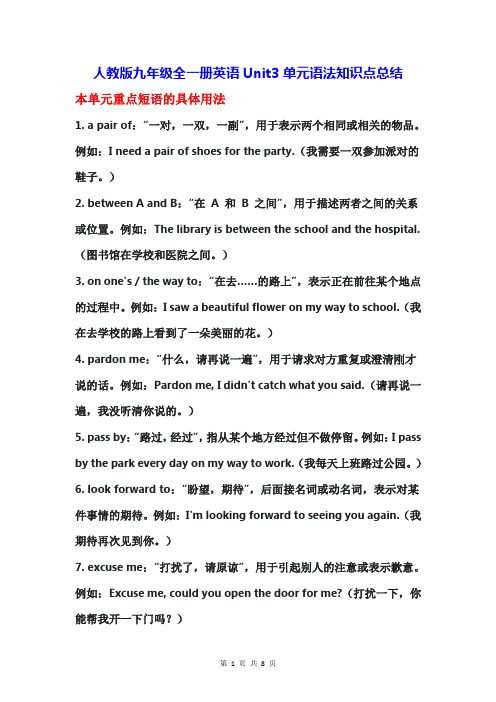
人教版九年级全一册英语Unit3单元语法知识点总结本单元重点短语的具体用法1. a pair of:“一对,一双,一副”,用于表示两个相同或相关的物品。
例如:I need a pair of shoes for the party.(我需要一双参加派对的鞋子。
)2. between A and B:“在A 和B 之间”,用于描述两者之间的关系或位置。
例如:The library is between the school and the hospital.(图书馆在学校和医院之间。
)3. on one's / the way to:“在去……的路上”,表示正在前往某个地点的过程中。
例如:I saw a beautiful flower on my way to school.(我在去学校的路上看到了一朵美丽的花。
)4. pardon me:“什么,请再说一遍”,用于请求对方重复或澄清刚才说的话。
例如:Pardon me, I didn't catch what you said.(请再说一遍,我没听清你说的。
)5. pass by:“路过,经过”,指从某个地方经过但不做停留。
例如:I pass by the park every day on my way to work.(我每天上班路过公园。
)6. look forward to:“盼望,期待”,后面接名词或动名词,表示对某件事情的期待。
例如:I'm looking forward to seeing you again.(我期待再次见到你。
)7. excuse me:“打扰了,请原谅”,用于引起别人的注意或表示歉意。
例如:Excuse me, could you open the door for me?(打扰一下,你能帮我开一下门吗?)8. get some information about:“获取有关……的一些信息”,用于表示获取关于某个主题的信息。
九年级英语第三单元语法总结完整版
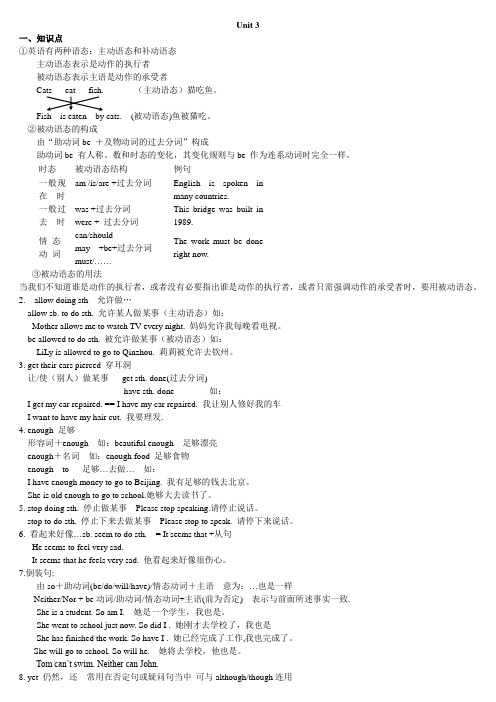
Unit 3一、知识点①英语有两种语态:主动语态和补动语态主动语态表示是动作的执行者被动语态表示主语是动作的承受者Cats eat fish. (主动语态)猫吃鱼。
Fish is eaten by cats.(被动语态)鱼被猫吃。
②被动语态的构成由“助动词be +及物动词的过去分词”构成助动词be 有人称、数和时态的变化,其变化规则与be 作为连系动词时完全一样。
时态被动语态结构例句一般现在时am /is/are +过去分词English is spoken inmany countries.一般过去时was +过去分词were + 过去分词This bridge was built in1989.情态动词can/shouldmay +be+过去分词must/……The work must be doneright now.③被动语态的用法当我们不知道谁是动作的执行者,或者没有必要指出谁是动作的执行者,或者只需强调动作的承受者时,要用被动语态。
2. allow doing sth 允许做…allow sb. to do sth. 允许某人做某事(主动语态)如:Mother allows me to watch TV every night. 妈妈允许我每晚看电视。
be allowed to do sth. 被允许做某事(被动语态)如:LiLy is allowed to go to Qinzhou. 莉莉被允许去钦州。
3. get their ears pierced 穿耳洞让/使(别人)做某事get sth. done(过去分词)have sth. done 如:I get my car repaired. == I have my car repaired. 我让别人修好我的车I want to have my hair cut. 我要理发.4. enough 足够形容词+enough 如:beautiful enough足够漂亮enough+名词如:enough food 足够食物enough to 足够…去做…如:I have enough money to go to Beijing. 我有足够的钱去北京。
九年级英语unit3语法知识点
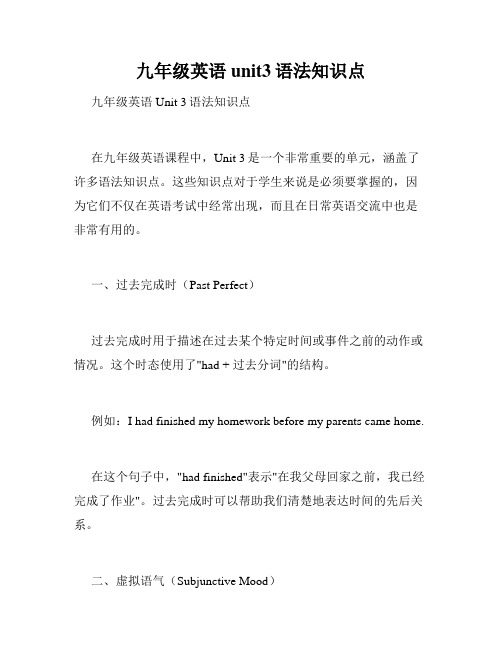
九年级英语unit3语法知识点九年级英语Unit 3语法知识点在九年级英语课程中,Unit 3是一个非常重要的单元,涵盖了许多语法知识点。
这些知识点对于学生来说是必须要掌握的,因为它们不仅在英语考试中经常出现,而且在日常英语交流中也是非常有用的。
一、过去完成时(Past Perfect)过去完成时用于描述在过去某个特定时间或事件之前的动作或情况。
这个时态使用了"had + 过去分词"的结构。
例如:I had finished my homework before my parents came home.在这个句子中,"had finished"表示"在我父母回家之前,我已经完成了作业"。
过去完成时可以帮助我们清楚地表达时间的先后关系。
二、虚拟语气(Subjunctive Mood)虚拟语气用于表示非现实的、不可能实现的条件、愿望或建议。
在虚拟语气中,谓语动词的形式通常是"should + 动词原形"。
例如:If I were you, I would study harder.在这个句子中,"were"是"be"的过去式,用于表示"假设"的条件。
虚拟语气在表达愿望、建议和与现实相反的情况时非常常见。
三、定语从句(Relative Clauses)定语从句是用来修饰名词的从句,通常由关系代词(who, whom, whose, which, that)或关系副词(where, when)引导。
例如:The book that I borrowed from the library is very interesting.在这个句子中,"that I borrowed from the library"修饰了先行词"book",用于限定"我从图书馆借来的那本书"。
九年级英语第三单元知识点

九年级英语第三单元知识点九年级英语第三单元包含了一系列的知识点,涉及语法、词汇、阅读理解等方面。
下面将介绍这些知识点,并给出相应的例句以帮助学生更好地理解和掌握。
一、语法知识点1. 过去进行时:表示过去某一时间段正在进行的动作或状态。
构成:was/were + 动词的进行时形式。
例句:I was watching TV when she called me.(当她打电话给我时,我正在看电视)2. 定语从句:用来修饰名词或代词的从句,用于进一步说明或限制名词或代词。
例句:The book that I borrowed from the library is very interesting.(我从图书馆借的那本书很有趣)3. 祈使句:以动词原形开头,表达命令、请求、建议等。
例句:Be quiet and listen to the teacher.(安静并听老师讲课)二、词汇知识点1. 形容词比较级与最高级:用于比较两个或多个事物的程度或大小。
例句:He is taller than his sister.(他比他妹妹高)2. 非谓语动词:包括不定式、动名词和分词三种形式。
它们在句子中作主语、宾语、表语、定语、状语等成分。
例句:Swimming is my favorite sport.(游泳是我最喜欢的运动)三、阅读理解阅读理解是考察学生对文章理解和分析能力的一种题型,可以分为短文填空、选择题、判断题等形式。
例句:阅读下面的短文,然后回答问题。
John was born on October 12th, 2003. He is from London, England. He has a sister and a brother. His sister's name is Emma, and his brother's name is David. John's favorite subject is math. He thinks it's very interesting. He also likes playing basketball and listening to music in his free time.问题:What is John's favorite subject?答案:Math.四、写作技巧写作是培养学生综合运用语言能力的重要环节。
英语九年级第三单元知识点
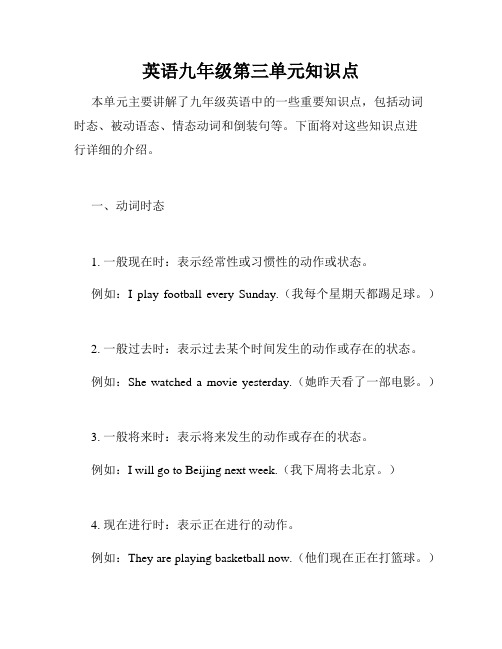
英语九年级第三单元知识点本单元主要讲解了九年级英语中的一些重要知识点,包括动词时态、被动语态、情态动词和倒装句等。
下面将对这些知识点进行详细的介绍。
一、动词时态1. 一般现在时:表示经常性或习惯性的动作或状态。
例如:I play football every Sunday.(我每个星期天都踢足球。
)2. 一般过去时:表示过去某个时间发生的动作或存在的状态。
例如:She watched a movie yesterday.(她昨天看了一部电影。
)3. 一般将来时:表示将来发生的动作或存在的状态。
例如:I will go to Beijing next week.(我下周将去北京。
)4. 现在进行时:表示正在进行的动作。
例如:They are playing basketball now.(他们现在正在打篮球。
)5. 过去进行时:表示过去某一时刻正在进行的动作。
例如:We were studying when the teacher came in.(当老师进来时,我们正在学习。
)二、被动语态被动语态表示主语是动作的接受者,而不是执行者。
构成被动语态的基本形式是“be + 过去分词”。
被动语态常用于以下情况:1. 当我们不知道或不关心动作的执行者时。
例如:The book was written in 1990.(这本书是在1990年写的。
)2. 当我们要强调动作的接受者时。
例如:The letter was sent to Mary by her friend.(这封信是由她的朋友寄给玛丽的。
)三、情态动词情态动词用来表示可能性、能力、许可、建议等。
常见的情态动词有can、could、may、might、shall、should、will、would、must等。
下面列举了一些常用的情态动词和其用法:1. Can:表示能力、许可或可能性。
例如:I can swim.(我会游泳。
)2. Could:表示过去的能力、可能性或请求。
九年级英语全一册语法总结(Unit3)
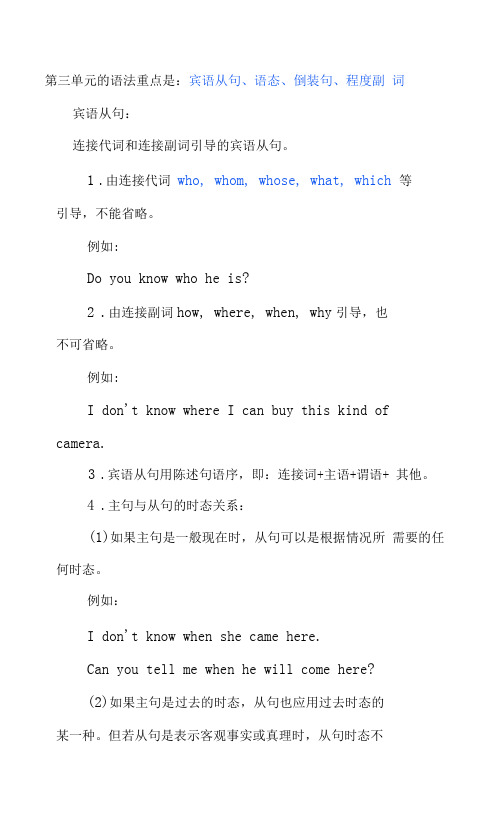
第三单元的语法重点是:宾语从句、语态、倒装句、程度副词宾语从句:连接代词和连接副词引导的宾语从句。
1.由连接代词who, whom, whose, what, which 等引导,不能省略。
例如:Do you know who he is?2.由连接副词how, where, when, why引导,也不可省略。
例如:I don't know where I can buy this kind of camera.3.宾语从句用陈述句语序,即:连接词+主语+谓语+ 其他。
4.主句与从句的时态关系:(1)如果主句是一般现在时,从句可以是根据情况所需要的任何时态。
例如:I don't know when she came here.Can you tell me when he will come here?(2)如果主句是过去的时态,从句也应用过去时态的某一种。
但若从句是表示客观事实或真理时,从句时态不受主句时态的限制,应用一般现在时。
例如:He told us why he would stay at home the nextThe teacher explained how the earth goes around the sun.5.某些由连接代词或连接副词引导的宾语从句可改为含“特殊疑问词+动词不定式”结构的简单句。
例如:Can you tell me where I can buy this book?fCan you tell me where to buy this book?直击中考1.12017南昆明】.—Could you please tell me?一The people and the food.A.how does Tom like ChinaB. if Tom 1 ikesChinaC.what does Tom like about ChinaD.what Tom likes about China 2.12017广西贵港】.—Could youtell me?一Sure. A story book.A.when did your friend give it to youwhat didyour friend give youC.how your friend got to the supermarketD.what your friend gave you语态:①英语有两种语态:主动语态和被动语态主动语态表示主语是动作的执行者被动语态表示主语是动作的承受者②被动语态的构成由“助动词be+及物动词的过去分词”构成助动词be有人称、数和时态的变化,其变化规则与be作为连系动词时完全一样。
九年级第三单元语法知识点
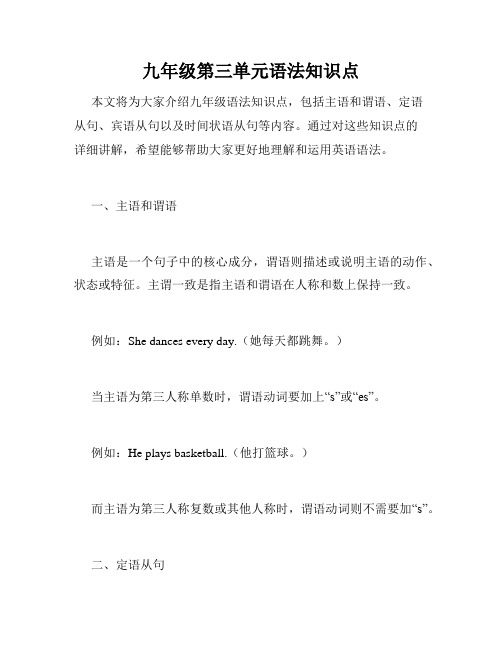
九年级第三单元语法知识点本文将为大家介绍九年级语法知识点,包括主语和谓语、定语从句、宾语从句以及时间状语从句等内容。
通过对这些知识点的详细讲解,希望能够帮助大家更好地理解和运用英语语法。
一、主语和谓语主语是一个句子中的核心成分,谓语则描述或说明主语的动作、状态或特征。
主谓一致是指主语和谓语在人称和数上保持一致。
例如:She dances every day.(她每天都跳舞。
)当主语为第三人称单数时,谓语动词要加上“s”或“es”。
例如:He plays basketball.(他打篮球。
)而主语为第三人称复数或其他人称时,谓语动词则不需要加“s”。
二、定语从句定语从句是用来修饰名词或代词的从句,通常由关系代词或关系副词引导。
例如:The book that I borrowed from the library is very interesting.(我从图书馆借的那本书非常有趣。
)在上面的例句中,定语从句“that I borrowed from the library”修饰了名词“book”。
关系代词有:that, which, who, whom, whose等;关系副词有:when, where, why等。
定语从句既可以修饰人也可以修饰物,要正确理解和运用关系代词和关系副词的用法。
三、宾语从句宾语从句是用来作主句动词的宾语的从句,通常由连接词that 引导。
例如:She said that she would come to the party.(她说她会来参加派对。
)在上面的例句中,宾语从句“that she would come to the party”作为动词“said”的宾语。
宾语从句常用的连接词有:that, if, whether等,根据具体情况来选择适当的连接词。
四、时间状语从句时间状语从句用来表示动作发生的时间、顺序或条件,通常由引导词引导。
例如:I will call you when I finish my homework.(我完成作业后会给你打电话。
九年级英语unit3知识点总结
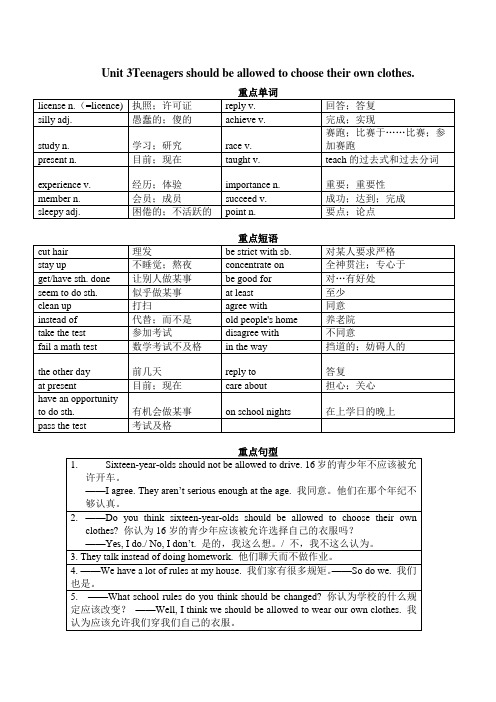
Unit 3Teenagers should be allowed to choose their own clothes.重点单词license n. (=licence) 执照;许可证reply v. 回答;答复silly adj. 愚蠢的;傻的achieve v. 完成;实现study n. 学习;研究race v. 赛跑;比赛于……比赛;参加赛跑present n. 目前;现在taught v. teach的过去式和过去分词experience v. 经历;体验importance n. 重要;重要性member n. 会员;成员succeed v. 成功;达到;完成sleepy adj. 困倦的;不活跃的point n. 要点;论点重点短语cut hair 理发be strict with sb. 对某人要求严格stay up 不睡觉;熬夜concentrate on 全神贯注;专心于get/have sth. done 让别人做某事be good for 对…有好处seem to do sth. 似乎做某事at least 至少clean up 打扫agree with 同意instead of 代替;而不是old people's home 养老院take the test 参加考试disagree with 不同意fail a math test 数学考试不及格in the way 挡道的;妨碍人的the other day 前几天reply to 答复at present 目前;现在care about 担心;关心have an opportunityto do sth. 有机会做某事on school nights 在上学日的晚上pass the test 考试及格重点句型1.____Sixteen-year-olds should not be allowed to drive. 16岁的青少年不应该被允许开车。
人教版英语九年级unit3知识点总结
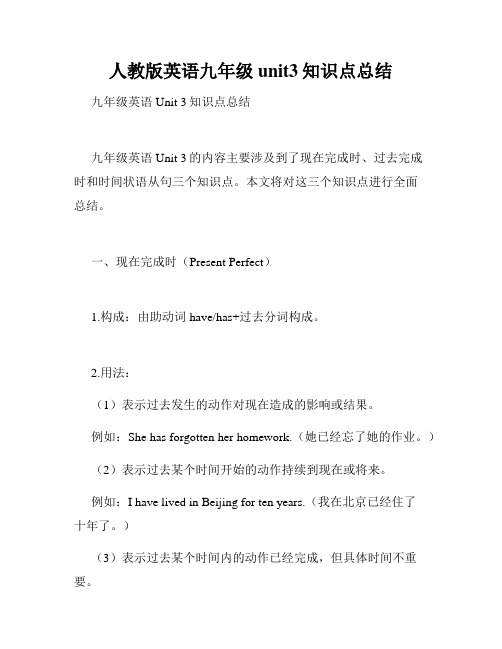
人教版英语九年级unit3知识点总结九年级英语Unit 3知识点总结九年级英语Unit 3的内容主要涉及到了现在完成时、过去完成时和时间状语从句三个知识点。
本文将对这三个知识点进行全面总结。
一、现在完成时(Present Perfect)1.构成:由助动词have/has+过去分词构成。
2.用法:(1)表示过去发生的动作对现在造成的影响或结果。
例如:She has forgotten her homework.(她已经忘了她的作业。
)(2)表示过去某个时间开始的动作持续到现在或将来。
例如:I have lived in Beijing for ten years.(我在北京已经住了十年了。
)(3)表示过去某个时间内的动作已经完成,但具体时间不重要。
例如:He has read that book before.(他以前读过那本书。
)(4)与现在相关的一些时间状语:already(已经)、just(刚刚)、yet(还)、ever(曾经)、never(从未),等等。
3.注意事项:(1)现在完成时一般不与表明过去具体时间的状语连用。
例如:He has gone to Guangzhou yesterday.(错误)(2)未来时不能与现在完成时连用。
例如:I have passed the exam tomorrow.(错误)二、过去完成时(Past Perfect)1.构成:由had+过去分词构成。
2.用法:(1)表示在过去某个时间或动作之前已经发生或完成的动作或状态。
例如:He had finished his homework before I arrived.(我到达之前他已经完成了作业。
)(2)常与by/before引导的时间状语连用。
例如:She had left home before I got there.(我到那时她已经离家了。
)3.注意事项:过去完成时主要强调在过去某个时间或动作之前已经发生或完成的动作,对过去的过去进行描述。
Unit3知识点总结人教版九年级英语全册
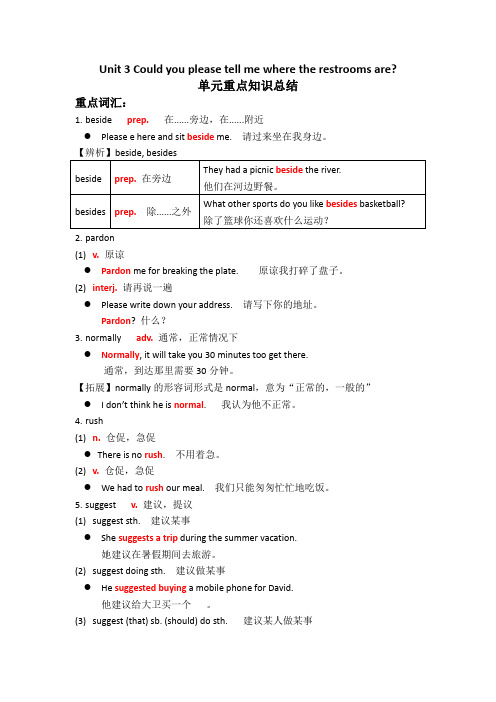
Unit 3 Could you please tell me where the restrooms are?单元重点知识总结重点词汇:1.beside prep. 在......旁边,在......附近●Please e here and sit beside me. 请过来坐在我身边。
2.pardon(1)v. 原谅●Pardon me for breaking the plate. 原谅我打碎了盘子。
(2)interj. 请再说一遍●Please write down your address. 请写下你的地址。
Pardon? 什么?3.normally adv.通常,正常情况下●Normally, it will take you 30 minutes too get there.通常,到达那里需要30分钟。
【拓展】normally的形容词形式是normal,意为“正常的,一般的”●I don’t think he is normal. 我认为他不正常。
4.rush(1)n. 仓促,急促●There is no rush. 不用着急。
(2)v. 仓促,急促●We had to rush our meal. 我们只能匆匆忙忙地吃饭。
5.suggest v. 建议,提议(1)suggest sth. 建议某事●She suggests a trip during the summer vacation.她建议在暑假期间去旅游。
(2)suggest doing sth. 建议做某事●He suggested buying a mobile phone for David.他建议给大卫买一个。
(3)suggest (that) sb. (should) do sth. 建议某人做某事●I suggest (that) you (should) have a conversation with him .我建议你和他谈谈。
- 1、下载文档前请自行甄别文档内容的完整性,平台不提供额外的编辑、内容补充、找答案等附加服务。
- 2、"仅部分预览"的文档,不可在线预览部分如存在完整性等问题,可反馈申请退款(可完整预览的文档不适用该条件!)。
- 3、如文档侵犯您的权益,请联系客服反馈,我们会尽快为您处理(人工客服工作时间:9:00-18:30)。
Unit 3一、知识点①英语有两种语态:主动语态和补动语态主动语态表示是动作的执行者被动语态表示主语是动作的承受者Cats eat fish. (主动语态)猫吃鱼。
Fish is eaten by cats.(被动语态)鱼被猫吃。
②被动语态的构成由“助动词be +及物动词的过去分词”构成助动词be 有人称、数和时态的变化,其变化规则与be 作为连系动词时完全一样。
时态被动语态结构例句一般现在时am /is/are +过去分词English is spoken inmany countries.一般过去时was +过去分词were + 过去分词This bridge was built in1989.情态动词can/shouldmay +be+过去分词must/……The work must be doneright now.③被动语态的用法当我们不知道谁是动作的执行者,或者没有必要指出谁是动作的执行者,或者只需强调动作的承受者时,要用被动语态。
2. allow doing sth 允许做…allow sb. to do sth. 允许某人做某事(主动语态)如:Mother allows me to watch TV every night. 妈妈允许我每晚看电视。
be allowed to do sth. 被允许做某事(被动语态)如:LiLy is allowed to go to Qinzhou. 莉莉被允许去钦州。
3. get their ears pierced 穿耳洞让/使(别人)做某事get sth. done(过去分词)have sth. done 如:I get my car repaired. == I have my car repaired. 我让别人修好我的车I want to have my hair cut. 我要理发.4. enough 足够形容词+enough 如:beautiful enough足够漂亮enough+名词如:enough food 足够食物enough to 足够…去做…如:I have enough money to go to Beijing. 我有足够的钱去北京。
She is old enough to go to school.她够大去读书了。
5. stop doing sth. 停止做某事Please stop speaking.请停止说话。
stop to do sth. 停止下来去做某事Please stop to speak. 请停下来说话。
6. 看起来好像…sb. seem to do sth. = It seems that +从句He seems to feel very sad.It seems that he feels very sad. 他看起来好像很伤心。
7.倒装句:由so+助动词(be/do/will/have)/情态动词+主语意为:…也是一样Neither/Nor + be动词/助动词/情态动词+主语(前为否定) 表示与前面所述事实一致.She is a student. So am I.她是一个学生,我也是。
She went to school just now. So did I . 她刚才去学校了,我也是She has finished the work. So have I . 她已经完成了工作,我也完成了。
She will go to school. So will he.她将去学校,他也是。
Tom can’t swim. Neither can John.8. yet 仍然,还常用在否定句或疑问句当中可与although/though连用9. stay up 熬夜如:I often stay up until 12:00pm.我经常熬夜到12点。
10. clean up 打扫整理如:I have cleaned up the bedroom. 我已经打扫完了卧室。
11. 程度副词:always总是usually经常sometimes有时never从不如:I am always/usually/sometimes/never late for school.我总是/经常/有时/从不上学迟到。
12. 曾经做某事:Do you ever get to school late? Yes, I do. No, I don’t.Have you ever got to school late? Yes, I have. No, I haven’t.13. go shopping(去购物), go fishing(去钓鱼)go swimming(去游泳), go boating(去划船)go hiking(去登山), go trekking(去徒步)14. .be strict with+人. be strict in+事物.例: The head teacher is strict with his studentsHe is strict in the work.15. take the test 参加考试pass the test 通过考试fail a test 考试失败16. the other day前几天,不久前的一天.(用于过去时)every other day = every two days 每隔一天(每两天)17. agree 同意反义词disagree不同意动词agreement 同意反义词disagreement 不同意名词18. keep sb/ sth. +形容词使某人/某物保持….如:We should keep our city clean.(cleanin gⅹ)我们应该保持我们的城市干净。
Don’t keep me waiting for a long time.别让我等得太久。
19. both…and…+动词复数形式如:Both Jim and Li Ming play bastketball.20. learn (sth.) from sb. 向谁学习(什么) 如:Jim learnt English from his English teacher. 吉姆向他的英语老师学习英语21. have an opportunity to do sth. 有机会做某事have a chance of doing sth. 有机会做某事如:I have an opportunity to go to Beijing. I have a chance of going to Beijing.22. at present 目前23. at least 最少at most 最多24. 花费take ,cost, spend , payIt take (sb.) time to do sth. It took (me) 10days to read the book.sth. cost (sb.) ……The book cost (me) 100yuan.sb. spend … on sth. She spent 10days on this book.sb. spend …doing sth. She spent 10days reading this book.sb. pay … for sth. She paid 10yuan for this book.25. have +时间段+off 放假,休息如:have 2 days offoff 不工作,不上班,不上学,不值班.例: I think I’ll take the afternoon off. 我想下午歇班.She is off today. 她今天休息.I have three days off next week. 下周我有三天假.They haven’t had a day off since last week. 从上周来,他们没休息过一天.26. reply to 答复某人如:She replayed to MrGreen.27. agree with sth. 同意某事如:I agree with that idea.agree to sb. 同意某人的意见如:I agree to LiLei.28. get in the way of 碍事,妨碍如:Her social life got in the way of her studies. 她的社会生活妨碍了她的学习。
He never gets in others’way. 他从不妨碍别人.The bikes over there will get in the way of others. 自行车放在那里会妨碍别人的.29. success n. succeed v. successful adj. successfully adv.30. think about 与think of 的区别①当两者译为:认为、想起、记着时,两者可互用I often think about/ of that day. 我经常想起那天。
②think about 还有“考虑”之意,think of 想到、想出时两者不能互用At last, he thought of a good idea. 最后他想出了一个好主意。
We are thinking about going Qinzhou. 我们正在考虑去钦州。
31. 对…热衷,对…兴趣be serious about doing 如:She is serious about dancing. 她对跳舞热衷。
be serious about sth. 如:She is serious about him. 她对他感兴趣。
32. practice doing 练习做某事She often practice speaking English.33. care about sb. 关心某人如:Mother often care about her son.34. also 也用于句中either也用于否定句且用于句末too=as well 也用于肯定句且用于句末I am also a student. 我也是一个学生I am a student too. 我也是一个学生。
I am not a student either. 我也不是一个学生。
36.stupid silly foolish 三个词都有“蠢”的意思.但略有不同.stupid 程度最强,指智力理解力学习能力差. silly 指头脑简单,傻头傻脑,使人觉得可笑,带有感情色彩. foolish 尤其在口语中广泛使用.例: He is stupid in learning math. 他学习数学很笨.Stop asking such silly questions. 别再问这样傻的问题了.You are foolish to throw away such a good chance.你真蠢,丢掉这样一个好机会.37.He doesn’t seem to have many friends.=It seems that he doesn’t have many friends.=He seems not to have many friends.38.clean (v.) 打扫,清理clean up 比较彻底地打扫,清理clean out 打扫,清理地最彻底.39.concentrate on…全神贯注做…例: He decided to concentrate on physics because he failed the exam.This company concentrates on China market.这家公司把重点放在中国市场上.40. more…than…①与其说…不如说…; 比…更…例: The man is more stupid than nervous.与其说那人紧张,倒不如说他愚蠢.②在这一结构中,more做adj. 修饰名词,表示“比…多”例:I have more books than you. 我的书比你的多.41.volunteer ①n. 自愿者. ②v. volunteer to do sth. 自愿做…例: We all volunteered to help in the old people’s home.我们都志愿到敬老院帮忙.44. only 处于句首,并后跟状语时,全句需要倒装.例: Only then did he understand it. 只有到那时,他才明白.Only in this way can we learn English well. 只有这样我们才能把英语学好. Only when she came home, did he learn the news. 当她到家时,他才得知了这消息.45. care about 关心,在乎,在意.例: No one cares about others nowadays. 现在没人关心别人.I don’t care about what he does. 我并不在意他干什么.二、短语1. be allowed to do sth 被允许干…allow sb to do sth 允许某人干…allow doing sth 允许干…2. sixteen-year-olds = sixteen-year-old boys and girls 16岁的孩子3. part-time jobs 兼职工作4. a driver’s license 驾照5. on weekends 在周末6. at that age 在那个年龄段7. on school nights 在上学期间的每个晚上8. stay up 熬夜9. clean up (相当与及物动词) 清扫10. fail (in) a test 考试不及格11. take the test 参加考试12. the other day 前几天13. all my classmates 我所有的同学14. concentrate on 全神贯注于15. be good for 对…有益16. in groups 成群的,按组的17. get noisy 吵闹(系表结构)18. learn from 向某人学习19. at present 目前,现在20. have an opportunity to do sth 有做…的机会21.English-English dictionary 英英词典22. at least 至少23.eight hours’sleep a night 每晚8小时的睡眠24. an old people’s home 敬老院25. take time to do sth 花费时间干…26. primary schools 小学27. have…off 放假,休息28. reply to 回答,答复29. get in the way of 妨碍30. a professional athlete 职业运动员31. achieve one’s dreams 实现梦想32. think about 思考,考虑33. in the end 最后,终于34. be serious about 对…热忠/极感兴趣35. spend…on + n. spend …(in) + v-ing 在…上花费时间/金钱36. care about 关心,担心,在乎37. agree with 同意…。
